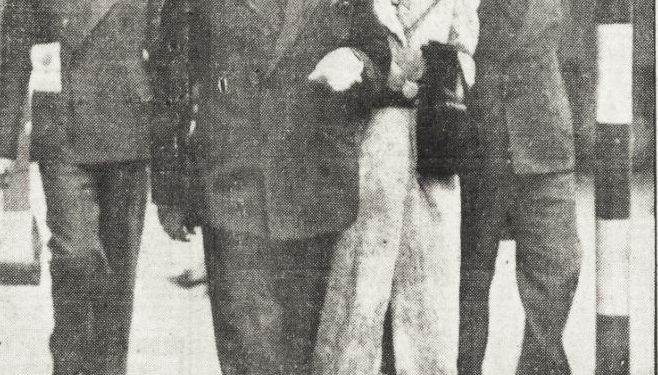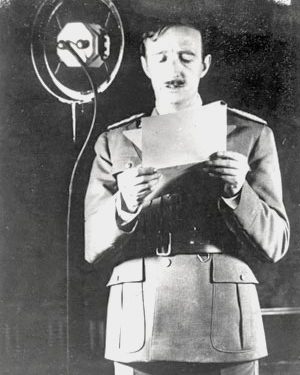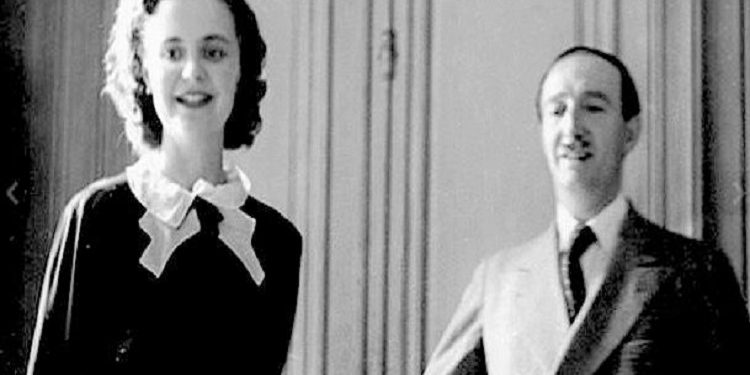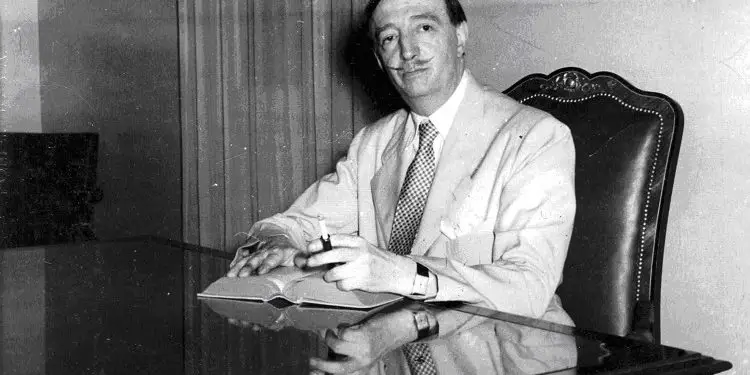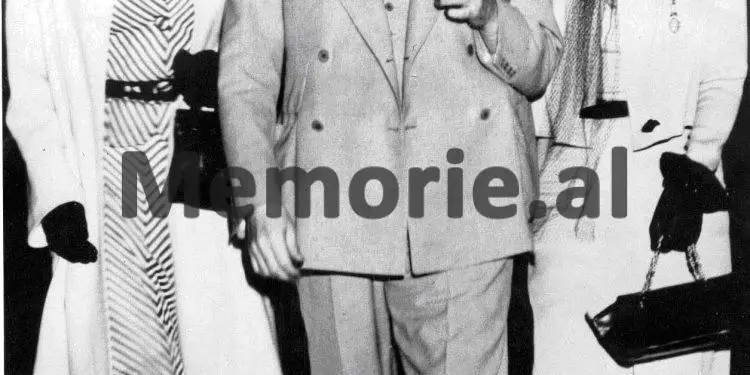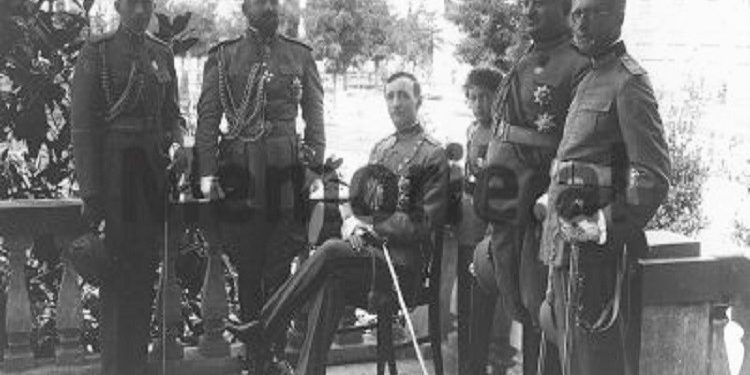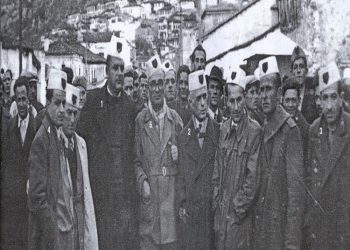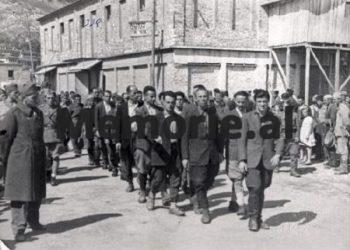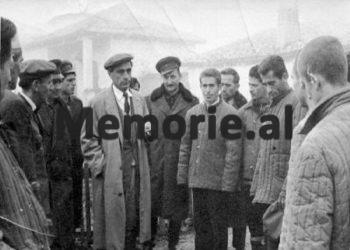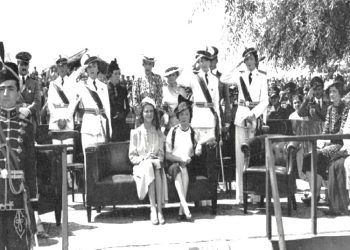By Erald Capri
– King Zog and the attempt for a second triumph of Legality in Albania –
Memorie.al / The triumph of legality on December 24, 1924, mark a turning point in Albanian politics, but it undoubtedly remains Ahmet Zogu’s culminating point as a politician. He was the dominant politician in the country, during the years ’20 – ’24, the longest-serving power holder and after going into exile, he managed to triumph again, taking control of the entire territory and establishing legitimacy in the country. The invasion of Albania by Fascist Italy on April 7, 1939, would start another political exile for King Zog, which, quite unlike the first, would be to his many advantages.
Initially, King Zog I resisted every Italian temptation to turn Albania into a protectorate of Italy, even though he promised him the country’s crown again. In those difficult days of April 1939, the King succeeded in winning the moral battle with world opinion and especially with the international media.
The recently discovered documentation in the British Archives suggests without any equivocation that King Zog, and henceforth Albania, became a victim of the aggravated international situation. On April 10, that is, Monday and three days after the invasion of Albania had begun, the British government started its meeting regarding the situation in Albania.
British officials did not quietly accept this invasion, quite unlike what is believed today, but used this invasion, in some favors of the British in the Mediterranean basin. In his memoirs, Prime Minister Chamberlain says that Mussolini behaved like a snake. Churchill, still without a post, would say that the Second World War was already on the horizon.
With the invasion of Albania, the British seem to have followed the spirit of the Munich Treaty, with the desire that by satisfying the Italians, they will avoid a world war. In the conversations shown at the cabinet meeting with Count Ciano, Italy guaranteed that it would not touch Greece, or Yugoslavia, would withdraw troops from Franco’s Spain, as well as remove some military forces to some small islands in the Mediterranean.
Quite maliciously and acting short-sightedly, the neighboring governments of Yugoslavia and Greece did not react, although they already had a potential enemy on the border. This reality shows the mirror and real-politics in international relations, in April 1939.
After a journey of over a year in Europe and with the start of the Second World War, King Zog settled in Great Britain, with the idea of setting up his government in exile and organizing the resistance in Albania.
The British documentation of the time for King Zog’s activity during these years is over three thousand pages, where a fairly dense activity of the Albanian King is evidenced. Quite unlike the other Kings who were officially recognized in Great Britain, as a government in exile, King Zog was the only one who managed to make a real attempt at an armed uprising in Albania.
British plan for armed movement
Although the British agreed that King Zog should move to Britain, they did not give him due attention from the beginning. Even the movements of the Bird were known to the Italians. Britain still had hopes that Italy would not enter the war but, after the invasion of France by Germany, in the summer of 1940, the Italians declared war on Britain.
At this very moment, a special office for top-secret guerilla warfare is set up in Britain, known as SOE (Special Operations Executive) or Special Operations Executive. An office for the resistance in Albania is established, headed by Malcolm Marr.
At this point, King Zog appears as the most important point for the British to create resistance in Albania and a very concrete plan is realized. In this office, the five British officers who had worked in Albania during the Kingdom of Zogu, for the organization of the gendarmerie, such as General Persi, Bill Barkook, who had worked with Persi and a good acquaintance of Albania, the former employee of Anglo Persian Oil Robert Crips.
Two other named officers arrived, such as Sterling and Martin, who had also worked in Albania. A British academic named Nicholas Hammond, who had lived for a year in Albania in the 1930s in order to write a book about King Zog, joined the office and agreed to run it in Athens. He lost his life on the boat trip in the Mediterranean, after an enemy attack.
In their report to the chiefs, they instructed that; King Zog was the only potential in 1940 and 1941 that could create an armed movement. At the end of 1940, when Italy had just declared war on Greece, King Zog was declared a priority by the British. Work began immediately on the crime of two fronts, one in the North and one in the South. Gani Kryeziu would attack in the north and King Zog in the south.
Gani Kryeziu came into contact in Belgrade with Julian Amer and, supported by the officer Oklai Hill, decided to carry out an uprising in the North. He gathered nearly 500 forces, a fund of 40 thousand sterling, in gold, was established. The attack started in the North, and Gani Kryeziu agreed to occupy Kukësi and declare it as an area administered by King Zog’s government.
But his attack began in April 1941, when the Germans had just begun their invasion of Yugoslavia. Caught between two fronts, he failed. Gani Kryeziu and his brother, Saidi, were exiled to Italy, while British officer Oklai Hill was arrested by the Germans.
While in the South, the work started with even greater ambition. Many Albanians in Istanbul got ready, led by Abaz Kupi. British military intelligence believed that King Bird would have an 80% chance of success. But at the last moment, the Greek Prime Minister, Metaksai, intervened, requesting the cancellation of this plan.
In the spring of 1941, the Greek troops had launched the offensive and entered Albania and did not want to give up this territory. In this situation, and under the insistence of the Greeks, the British inform King Zog at the last moment not to travel by plane to Cairo. In a way it was lucky because that plane crashed in the Mediterranean and all the crew lost their lives.
Why was King Zog’s government in exile not recognized?
King Zog was the only pre-war leader who had taken refuge in London who managed to have a concrete plan for creating a front in Albania. But this did not serve for him to be officially recognized by the British and allies. Although he had this advantage, and even the desire of the entire Albanian political emigration for Zogu to be their leader, the British did not recognize him.
This happened due to pressure from two other allies of the British, such as Yugoslavia and Greece. Then, with the entry of the Soviet Union into the war, King Zog took another hit. It may seem surprising, but among the few understandings Britain and the Soviet Union had, one of them had to do with King Bird. The Foreign Minister, Eden, in January 1942, met the Soviet ambassador, where they talked about Albania.
It was agreed that there would be an Albanian state after the war, but the Soviets insisted, without King Zog. In December 1942, the British decided for Albania that its borders would be reviewed after the war. In these conditions, King Zog was hit politically, as was the fate of his country.
A final attempt at Zog’s support was also sought by Churchill, but in October 1944, when he sought it, it was too late. He forgot to mention Albania at the Moscow Conference, and remembered the day after, only because of King Zog. The documents suggest that thanks to the role of Queen Geraldine, Churchill’s wife, she had done a lot of lobbying with her husband, so that King Zog would be supported.
CONCLUSIONS
The British analysts of the time, who have also consulted archival documents of the Ministry of War and the Ministry of Foreign Affairs, admit themselves that: if King Zog had been supported in time, in 1941, then he would have been the most important military force and political, in post-war Albania.
It is impossible in this period to separate the political fate of King Zog with that of his country, Albania. The political blow against Zog, not recognizing him, endangered Albania’s position in relation to its neighbors.
Secondly, the non-realization of the military plan paved the way for the communists to appear a year later, and through the military movement and a civil war, they took power. Launching an attack on Northern Greece, in the spring of 1941, would be a decisive step for King Zog and for the country itself.
Even if the King had failed militarily in the 1941 attempt, in the years that followed, his supporters would certainly have been more numerous. This hypothesis is also supported by the fact that Abaz Kupi had thousands of forces at his disposal in 1943-44.
These facts extracted from voluminous British documentation show how close King Zog was to a second triumph of Legality. Obstructed only by the geopolitical reality, King Zog could not avoid the national disaster that gripped the country for half a century, which the country still suffers today, the communist dictatorship.
On the 90th anniversary of the Triumph of Legality, Albanian legalists organized a solemn academy to commemorate this important event in the history of Albania.
I was given the opportunity to deliver a speech on an attempt by King Zog to organize an armed movement in World War II Albania. The data and facts of this period, which emerge from the British Archives, are extremely valuable and quite interesting for the activity of King Zog in exile. Memorie.al




